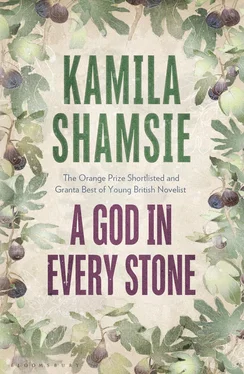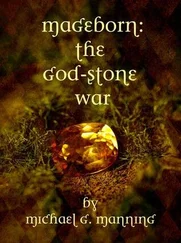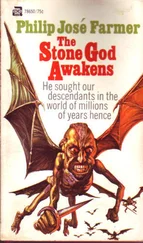Kamila Shamsie
A God in Every Stone
For the sisters — Saman, Magoo, Maha
Ancient Caria, including the site of Labraunda, is in present day Turkey. In 515 BC it lay at the western border of the Persian Empire; at the other end of the Empire, on the eastern border, was the settlement of Caspatyrus. The exact location of Caspatyrus has never been determined but some historians have placed it in or near Peshawar.
The greater part of Asia was discovered by Darius, who had wished to know where it was that the sea was joined by the River Indus (this being one of only two in the world which provides a habitat for crocodiles), and so sent ships with men on board whom he could trust to report back truthfully, including Scylax, a man from Caryanda. These duly set off from the city of Caspatyrus, in the land of Pactyike.
The Histories, Herodotus
Fig leaves and fruit twirl in Scylax’s hands. As he turns the silver circlet round and round, animating the engravings, he imagines flexing his wrist and watching the headpiece skim down
the
sloping
desert of the mountain,
across the jewelled valley of streams and fields and fruit,
to land
splash!
in the muddied tributary along which it races towards the crocodile-filled Indus.
Beside the distant riverbank, his ship is a brown smear. His crew think him mad to have spent all night on the mountain; but why explain to them, if they don’t already understand, the wonder of waking with the sun and, in the clear morning air, looking upon the rushing course of the Indus which is laid out before him like an offering. He places the circlet on his head, runs his rough sailor’s hands over the delicate figs embossed on it — in honour of his homeland of Caria, where men are barbarians but the fruit is sweet. So the Persians say — and yet here he is, one of the barbarian men, entrusted to lead the most daring of missions in the Empire. No man has ever navigated the mighty Indus. No man has ever attempted it. Not even Odysseus.
A flock of white birds swarms around his ship. No, it’s the sails. His crew has worked all night to surprise him with this gift. The ship is ready; the sails catch the wind and billow towards him. He whistles sharply and his horse, tethered further down the mountain, responds with a whinny. Scylax runs towards the noise; the distance between him and the ship suddenly enormous. Today it begins. Today they set sail from the city of Caspatyrus, edge of Darius’ empire, edge of the known world. Caspatyrus — the doorway to glory.
Vivian Rose Spencer was almost running now, up the mountainside, along the ancient paving stones of the Sacred Way, accompanied by an orchestra of birds, spring water, cicadas and the encounter of breeze and olive trees. The guide and donkeys were far behind, so there was no one to see her stop sharply beside a white block which had tumbled partway down the mountain centuries ago and rest her hands against its surface before bending close to touch her lips to it. Marble, grit, and a taste which made her jerk away in shock — the bones of Zeus’ sanctuary had the sweetness of fig. Either that, or a bird flying overhead might have dropped a fruit here, and the juice of it smeared against the stone. She looked down at her feet, saw a split-open fig.
— Labraunda! she called out, her voice echoing.
— Labraunda! she heard, bouncing back down the mountain at her. That wasn’t her voice at all. It was a man, his accent both familiar and foreign. But no, she was the foreign one here. She picked up the fig, held it to her nose and closed her eyes. She never wanted to return to London again.
The reports of the nineteenth-century travellers hadn’t prepared her for this: on the terraced upper slopes of the mountain enough of the vast temple complex remained intact to allow the imagination to pick up fallen colonnades, piece together the scattered marble and stone blocks, and imagine the grandeur that once was. Here, the Carian forces fled after losing a battle against the might of Darius’ Persians; here, the architects of the Mausoleum, that wonder of the world, honed their craft; here, Alexander came to see the mighty two-headed axe of the Amazon queen held aloft by the statue of Zeus.
Viv walked slowly, trying to take it all in: the ruins, half lost in foliage; the sounds of earth being turned, tree limbs hacked, voices speaking indistinct words; the view which held, all at once, the vast sky, the plain beneath, and the Aegean Sea in the distance. She had yet to become accustomed to the light of this part of the world — brilliant without being harsh, it made her feel she’d spent her whole life with gauze over her eyes. Something small and muscled charged at her, almost knocking her down.
— Alice! she cried out, and tried to pick up the pug, but the animal bounded ahead, and Viv followed, through a maze of broken columns taller than the tallest of men, until she saw the familiar lean form of her father’s old friend Tahsin Bey crouching on the ground next to a man with sandy-blond hair, pointing at something carved onto a large stone block — a serpentine shape, with a loop behind its open jaw.
— A snake, the man with sandy-blond hair said, in a German accent.
— An eel? suggested Tahsin Bey in that way he had of putting forward a certainty as though it were a theory he was asking you to consider.
— An eel? Why an eel?
It was Viv who answered, though she knew it was impolite to enter the conversation of men unaware of her presence.
— Because Pliny tells us that in the springs of Labraunda there are eels which wear earrings.
The two men turned to look at her, and she couldn’t stop herself from adding:
— And Aelian says there are fish wearing golden necklaces who are tamed, and answer the calls of men.
Tahsin Bey held out his hand, his smile of welcome overriding the formality of the gesture.
— Welcome to Labraunda, Vivian Rose.
His palm was calloused, and a few moments later when she raised her hand to brush some irritation out of her eye she smelt tobacco and earth overlaying fig. The richness of the scent made her linger over it until she saw the German looking at her with a knowing expression she didn’t like. Briskly, she lowered her hand and rubbed it on her skirt, all the while wondering how she would ever rest her eyes in this place with so much to see.
She woke up early the next morning, still wearing clothes from the day before. She had done little the previous afternoon beyond measure and sketch the columns of one of the buildings — a temple? an andron? a treasury? — but her muscles ached from the walk up the mountain and the half-delirious scrambling up and down the terraces before Tahsin Bey had instructed her to take her sketchbook and make herself useful. By dinnertime it had been all she could do to place her food in her mouth and chew while conversation buzzed around her, good-natured about her inability to participate.
She arose from her camp bed and changed her clothes quietly without disturbing the two German women in the tent, before stepping out into the hour between darkness and light. There was almost a chill in the air, but not quite, as she walked among the ruins, both hands held out to touch every block, every column she passed. A sharp yip cut through the silence. Looking around for Alice she found Tahsin Bey instead, sitting on the large rock with a fissure running through it — the split rock of Zeus — holding up a mug to her in greeting. Alice was dispatched to guide her up through trees and broken steps, and a few minutes later she was drinking hot tea from the cap of a thermos, watching the sun rise over the ancient land of Caria.
Читать дальше












